 A couple of years ago, my friend Kendra’s Buffy addiction reached a level that distressed me. “Excuse me?” I said. “I saw that Luke Perry movie and it was crap. Why would I want to watch it on TV?” I was contemplating an intervention and instead she intervened on me. She sat me down in front of the television, season seven was on at the time, and what I saw and heard shut me up. After two and a half episodes I had to stop watching. I was hooked and I needed to go home immediately and start at the beginning.
A couple of years ago, my friend Kendra’s Buffy addiction reached a level that distressed me. “Excuse me?” I said. “I saw that Luke Perry movie and it was crap. Why would I want to watch it on TV?” I was contemplating an intervention and instead she intervened on me. She sat me down in front of the television, season seven was on at the time, and what I saw and heard shut me up. After two and a half episodes I had to stop watching. I was hooked and I needed to go home immediately and start at the beginning.
I achieved a spoiler-free zone for the year or so it took me to catch up to the series finale. And if you remember that time in magazine media, you have to agree that this was a coup. With a dearth of Buffy on the box Kendra was on to Season Five of Angel, but I refused to watch. I had to see the spin-off’s seasons simultaneous to its Buffy counterpart timeframe. 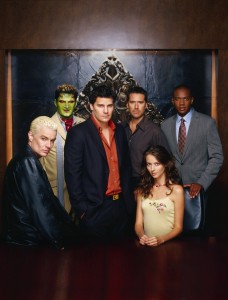 Continuity was key, but there would be no pacing myself here.
Continuity was key, but there would be no pacing myself here.
I rented, and then I just started buying each season as it came out on DVD. When one arrived in the mail, my lifestyle became as that of a free baser. No light penetrated the windows of my apartment. The telephone cord was pulled from the wall. I would not sleep for however many hours it took to watch the entire season straight through, including special features and commentaries. Oh yeah. Then rinse and repeat.
What’s silly about me even writing this down is that I can’t explain the show to you. I can tell you that it takes place in a world similar to ours—good people die for no reason, love rarely lasts, family relationships are hard, money is often tight, and friendship is what gets you through the rough spots. As in any good fable, the hero is unlikely and often reluctant. The good guys win every time, but there are casualties of love and war and consequences to be faced as a result of everyone’s actions.
And yet, it’s so much more than that. The vampires, demons, and otherworldly arch nemeses effectively polarize good and evil. The microcosm of high school raises the emotional stakes for everyone. You remember that time you’ve worked so hard to forget; you were more vulnerable, less jaded, and every day was its own universe. The superhero life lesson—brilliantly illustrated here, but best coined by Stan Lee—about power, responsibility, and sacrifice is ultimately all we need to know about growing up. Not just the adolescent kind, but the maturation through tough choices that continually forms and reforms every thinking adult. For my money, it’s the perfect moral fantasy.
And then there’s the whimsy. Along with the ubiquitous slaying comes the slayer punning, “Hi, I’m Buffy…and you are history.” Annoyed with her boyfriend Angel, a 241 year old vamp cursed with a soul, Buffy retorts, “You’re a vampire. Or is that an offensive term? Should I say undead American?” Disappointed at the prospect of having to bury a great big slimy demon that inconveniently doesn’t turn to dust when it dies, she muses, “Is anyone else waiting for it to go poof? Maybe we can cover it with flowers.” In just the first few years, the slayer and her friends face down so many apocalypses that when anyone observes the world is going to end, everyone’s immediate reaction is, “Again?” The second time Buffy dies, her epitaph reads: She saved the world. A lot.
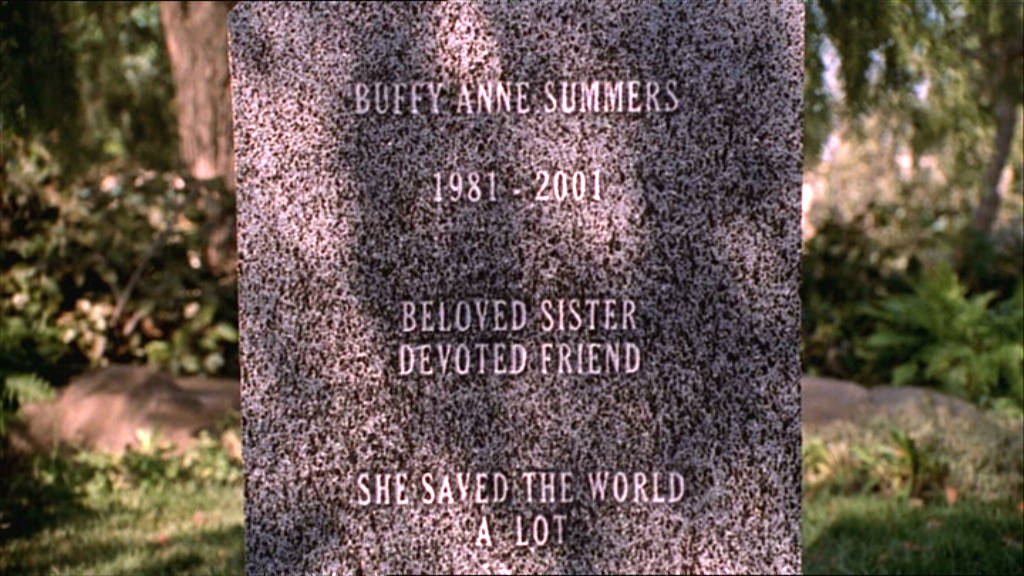
I can tell you all those things, but what you really need to understand the beauty of the show is to sit down and watch it. Intervene upon yourself. Try a couple of episodes. It’s either going to speak to you or it’s not. If it does, you will quickly understand that Buffy and Angel creator Joss Whedon is a total genius…if a bit of a mad one.
And (I know, you thought the thread was lost.) I’m back with the Milton! You see, Joss has also invented his own lexicon. While he creates words—shirty, single entendre, and nowned (as a potential basis for becoming renowned) come to mind—he really shines in the arena of hybrid phraseology. Like, “Raise your hand if eww.” Or behold the golden, “Wake up and smell the hottie!” And then there is the definitive achievement, the radical popularization of obscure cultural allusion that is “five by five.” No one knew exactly what it meant, but as soon as we heard it we all had to say it. When I heard Marshall do so in season four of Alias, I did the little dance men do when their sporting team wins something. Geek Nation had just swept the Super Bowl!
Of course, the man isn’t responsible for every scrap of the show’s dialogue, but his writers will tell you that when they’re complemented on a line from one of their episodes, ninety percent of the time Joss put it in. He’s that good. He’s so good that when he overcompensates, we go apeshit. Worried that the fans weren’t embracing Willow’s love interest, he wrote Oz the following speech.
“Sometimes, when I’m sitting in class—you know, I’m not thinking about class, cuz that would never happen—I think about kissing you. And, it’s like everything stops. It’s like freeze frame: Willow kissage… Oh, I’m not gonna kiss you.” “What? But freeze frame!” “Well, to the casual observer, it would appear that you’re trying to make your friend Xander jealous or even the score or something. And that’s on the empty side. See, in my fantasy, when I’m kissing you, you’re kissing me… It’s okay. I can wait.”
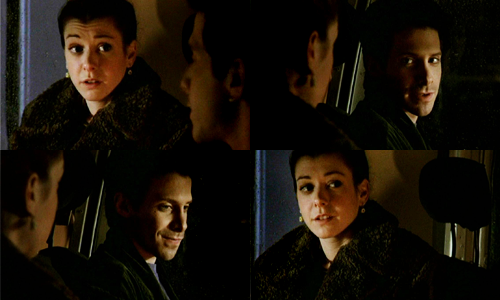
Everyone immediately fell in love with Oz—women and men, puppies and kittens, slugs and sewer rats…everyone. I know people (people who could be me) who replay that forty seconds seven or eight times every time they watch that episode. Genius. The truth is I could quote like that all day, but I won’t. I have a life to lead. A living to make. An ass to work off. I just needed you to know, he had me at Willow kissage.
I could touch on the deeper meaning behind the mythology, the philosophical symbolism, the metaphorical representation of the many villains, but there are volumes of academic and commercial texts out there to rival Blanford Parker’s chalkboard charts. Yes, there is even Slayer Slang. And I figure, at this point, I’ve either sold you or I’m not going to.
However, there is one more Miltonian parallel I would like to explore: the audience. Milton expected an educated readership and dubbed them the “fit though few.” I always thought that was pretty cool. Today, in an age when content is no longer crafted to pander to the lowest common denominator, but to cultivate it—at a time when a pop-culture fanatic like myself can’t even stand to have television in her home, it’s a phrase I’ve really come to appreciate. Because the fit though few are the revolution, people. They’re the rockers of the boat. And when they’re loud enough, they become the voice of change.
Nothing illustrates that point more clearly than the making of Serenity.
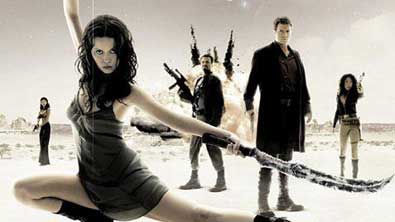

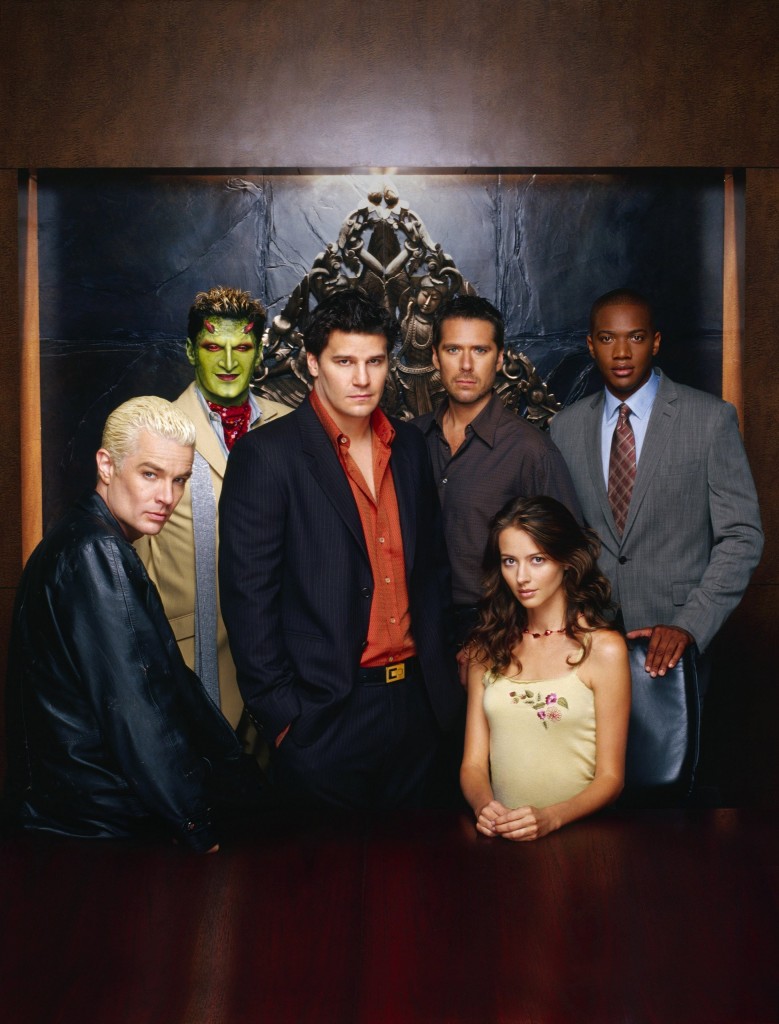
Chick shows, but hell ya with the nod to Firefly and their fans at the end :P